
City of Elkins May Be Ordered by the State to Take Over Water System in Whitmer
The water system in Whitmer, an unincorporated community in Randolph County, has been identified by the West Virginia Public Service Commission as a “failed utility.” Negotiations are under way between the Elkins Water Board and the West Virginia Public Service Commission (PSC) […]
